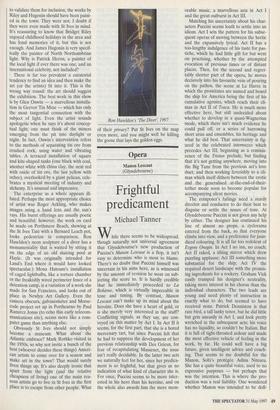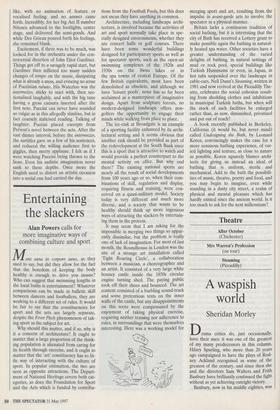Opera
Manon Lescaut (Glyndebourne)
Frightful predicament
Michael Tanner
While there seems to be widespread, though naturally not universal agreement that Glyndebourne's new production of Puccini's Manon Lescaut is a flop, it isn't easy to determine who is most to blame. There's no doubt that Puccini himself was uncertain in his aims here, as is witnessed by the amount of revision he went on sub- jecting the score to. It is hardly credible that he immediately proceeded to La Boheme, which is virtually impeccable in tone and timing. By contrast, Manon Lescaut can't make up its mind about the heroine. Does she have a heart of gold, or is she merely very interested in the stuff? Conflicting signals, as they say, are con- veyed on this matter by Act I. In Act II it seems, for the first part, that she is a bored mercenary tart, but since Puccini felt that he had to suppress the development of her previous relationship with Des Grieux, for fear of recapitulating Massenet, the issue isn't really decidable. In the latter two acts we naturally feel for her, since her predica- ment is so frightful, but that gives us no indication of what kind of character she is. For once, Puccini seems to be more inter- ested in his hero than his heroine, and on the whole also awards him the more mem- orable music, a marvellous aria in Act I and the great outburst in Act III.
Matching his uncertainty about his char- acters Puccini seems loath to settle into an idiom. Act I sets the pattern for his subse- quent operas of moving between the hectic and the expansively lyrical. Act II has a too-lengthy indulgence of his taste for pas- tiche, which he had little gift for but went on practising, whether by the attempted evocation of previous times or of distant places. Then, for the second and regret- tably shorter part of the opera, he moves decisively into his favourite vein of pouring on the pathos, the scene at Le Havre in which the prostitutes are named and board the ship for America being the first of his cumulative agonies, which reach their cli- max in Act II of Tosca. He is much more effective here, but still undecided about whether to develop in a quasi-Wagnerian mode, which there isn't much evidence he could pull off, or a series of harrowing short arias and ensembles, his heritage and what he did best. That uncertainty is fig- ured in the celebrated intermezzo which precedes Act III, beginning as a reminis- cence of the Tristan prelude, but finding that it's not getting anywhere, moving into the Big Tune from the previous act's love duet, and then working feverishly to a cli- max which itself dithers between the erotic and the generalised at-the-end-of-their- tether mode soon to become popular for accompanying silent movies.
The composer's failings need a sturdy director and conductor to do their best to disguise or settle the issues of tone. At Glyndebourne Puccini is not given any help by either. The designer has continued his line of almost no props, a cyclorama entered from the back, so that everyone climbs into view, and a preference for jaun- diced colouring. It is all far too redolent of Evgeny Onegin. In Act I no inn, no coach; Act II raked, a tilting mirror which drew puzzling applause; Act III something more substantial for the ship; Act IV the required desert landscape with the promis- ing ingredients for a rockery. Graham Vick easily trumped his designer's neutrality, taking more interest in his chorus than the individual characters. The two leads are young and need plenty of instruction in exactly what to do, but seemed to have received none. Patrick Denniston is that rare bird, a tall lanky tenor, but he did little but grin uneasily in Act I, and look pretty wretched in the subsequent acts; his voice has no liquidity, so couldn't be Italian. But it is full of tight-throated ardour and made the most effective vehicle of feeling in the work, by far. He could well have a big future, given intelligent advice and coach- ing. That seems to me doubtful for the Manon, Solti's protegee Adina Nitescu. She has a quite beautiful voice, used to no expressive purposes — but perhaps that was the intention. This is where the pro- duction was a real liability. One wondered whether Manon was intended to be doll- like, with no animation of feature or vocalised feeling: and no answer came forth. Incredibly, for her big Act II number Nitescu advanced to the footlights, centre stage, and delivered the semi-goods. And while Des Grieux poured forth his feelings, she remained blank.
Excitement, if there was to be much, was looked for in the orchestra under the con- troversial direction of John Eliot Gardiner. Things got off to a savagely rapid start, but Gardiner then inflicted too many sudden changes of tempo on the music, dissipating what is already a mess, and evincing no sense of Puccinian rubato. His Waterloo was the intermezzo, sticky to start with, then sec- tionalised laughably, and with the big tune having a gross caesura inserted after the first note. Puccini can never have sounded so vulgar as in this allegedly slimline, but in fact coarsely italicised reading. Talking of laughter: Puccini placed excerpts from Prevost's novel between the acts. After the vast dinner interval, before the intermezzo, the surtitles gave us a few of his sentences, and reduced the willing audience first to giggles, then merry applause. I felt as if I were watching Puccini being thrown to the lions. Even his sadistic imagination never sank to these depths. Once more the English need to distort an artistic occasion into a social one had carried the day.



































































 Previous page
Previous page